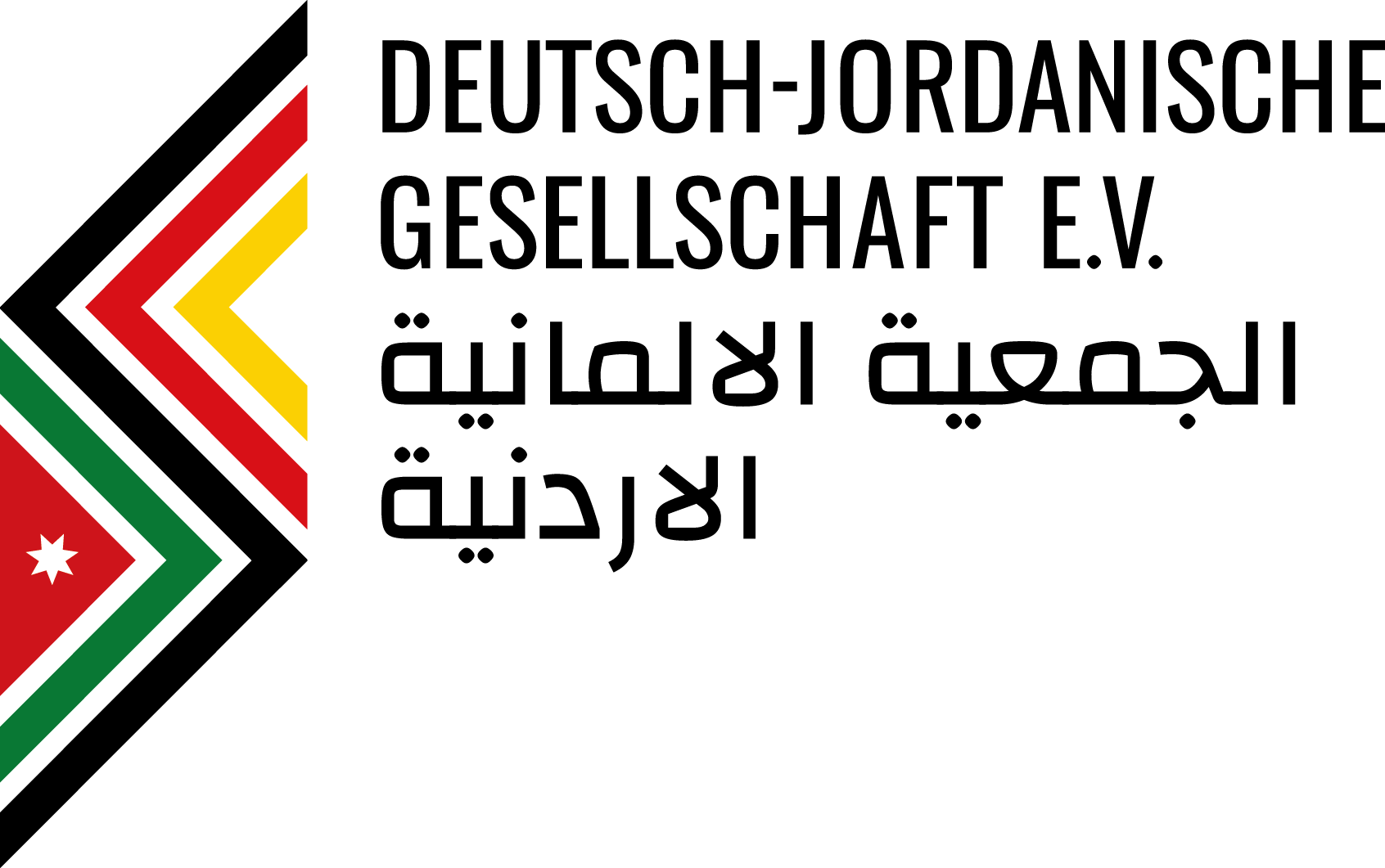April 2025
Global Disability Summit - Center of Hope war dabei
Mit Unterstützung der DJG besuchte Birgit Gassmann,
Leiterin des Center of Hope , das Summit.
Ein Bericht von Birgit Gassmann
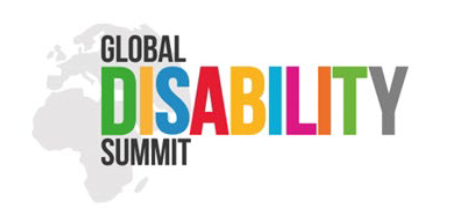
Das Thema des Summit war „Inklusion in allen Lebensbereichen“. Vorbereitet wurde das Summit gemeinsam von den Vertretern der Behindertenverbände in Deutschland und in Jordanien.
Der Kongress fand in der „Station“ Berlin statt, einem zum Kongresszentrum umgebauten ehemaligen Bahnhof. Im Foyer hatten zahlreiche Verbände aus aller Welt für die Belange von Menschen mit Behinderung ihren Stand aufgebaut, um ihre Arbeit vorzustellen. Für Deutschland zum Beispiel „Lebenshilfe“ und „GIZ“, für Jordanien „Higher Council“ und „The Medical City“.
In den anliegenden Konferenzräumen und –hallen fanden sogenannte „side events“ statt, größtenteils Podiumsdiskussionen über verschiedenste Themen. Obwohl für den 01. April nur „Registration“ vorgesehen war, fanden doch schon zahlreiche Podiumsdiskussionen bis zum Abend hin statt.
Ich hatte angenommen, der gesamte Kongress sei auch online zu verfolgen, aber es stellte sich heraus, dass das nur für die „Main Events“ galt. So wären mir ohne persönliche Teilnahme also nicht nur die vielen Kontakte, sondern tatsächlich die wesentlichen Themen entgangen.
Ich habe an verschiedenen Themen teilgenommen, die unsere Arbeit im „Center of Hope“ unmittelbar betreffen, wie „Inclusive employment in the Arab Region“. Aber auch Themen, die mir eher fremd waren, wie „Victim assistance in Disability Rights context“.
Zwischen den verschiedenen „events“ hatte man Gelegenheit, sich mit anderen Teilnehmern auszutauschen und Menschen kennenzulernen, denen man ansonsten sicher nie begegnen würde. Z.B. habe ich sehr Interessantes erfahren von der Behindertenbeauftragten von Palau (eine Inselgruppe östlich der Philippinen, nur falls außer mir noch jemand nicht weiß, wo Palau liegt).
Besonders interessant für mich war ein kurzes Gespräch mit der Sozialministerin von Jordanien. Es gibt viele Themen, die ich gerne mit ihr besprechen würde, und sie sagte mir einen Termin zu, wenn wir wieder in Amman sind. Daran werde ich sie in der nächsten Woche erinnern.
Insgesamt war es aufschlussreich und ermutigend, zu sehen, dass wirklich überall auf der Welt Bestrebungen um Inklusion auf allen Ebenen im Gange sind. Für das nächste Summit 2028 in Qatar haben sich mehr als 50 Länder und deren Behindertenverbände auf einige klare Ziele geeinigt, die sie erreichen und an denen sie sich 2028 auch tatsächlich messen lassen wollen.
Im Folgenden die Schlussdeklaration, auf die sich ebenfalls mehr als 50 Länder geeinigt haben:
Zusammenfassend kann ich sagen, dass die von mir ursprünglich vorgesehene Online-Beteiligung nicht annähernd die Informationen, Kontakte und Austauschmöglichkeiten geboten hätte. Mit mehreren Teilnehmern habe ich email-Adressen ausgetauscht, so dass wir in Kontakt bleiben und weiterhin von neuen Erfahrungen profitieren können.
Der Deutsch-Jordanischen Gesellschaft sage ich ein herzliches Danke, dass Sie mir die persönliche Teilnahme ermöglicht haben. Jetzt bin ich sehr gespannt, welche Auswirkungen wir in Jordanien in den kommenden Jahren erfahren werden.
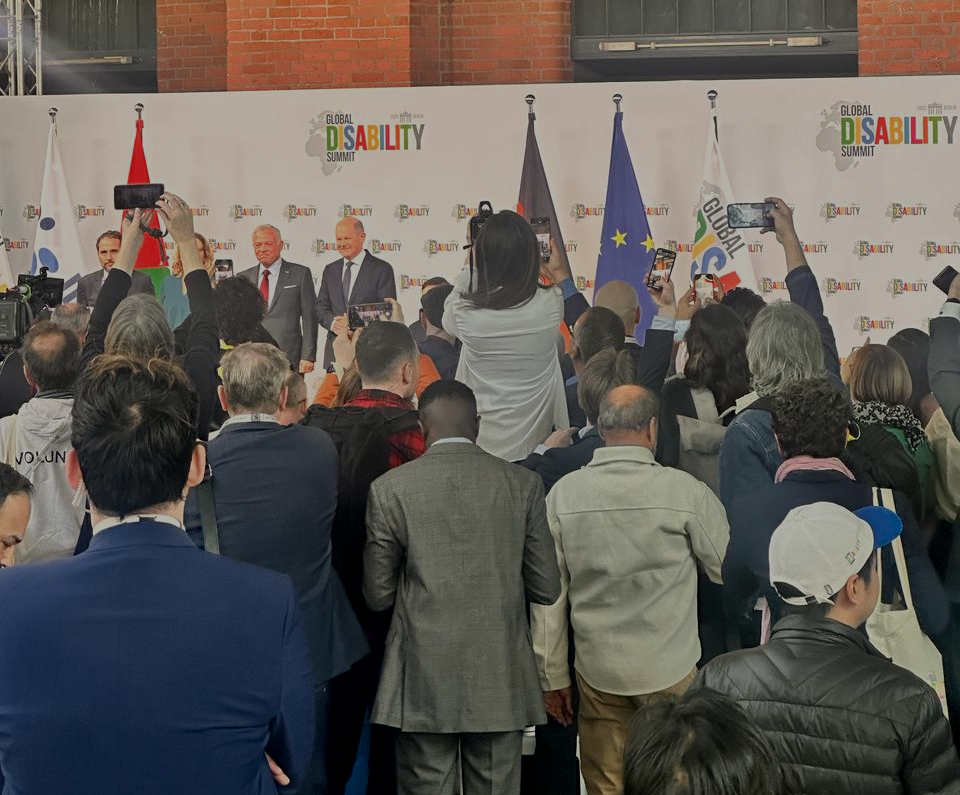
König Abdullah II und Bundeskanzler Scholz besuchen den GDS
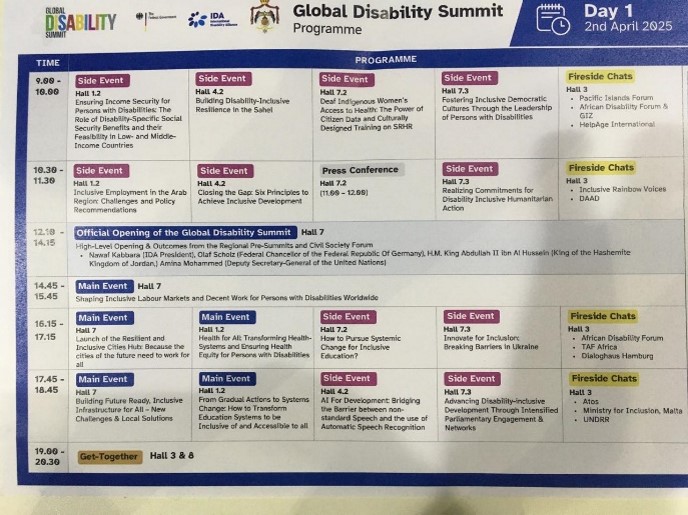
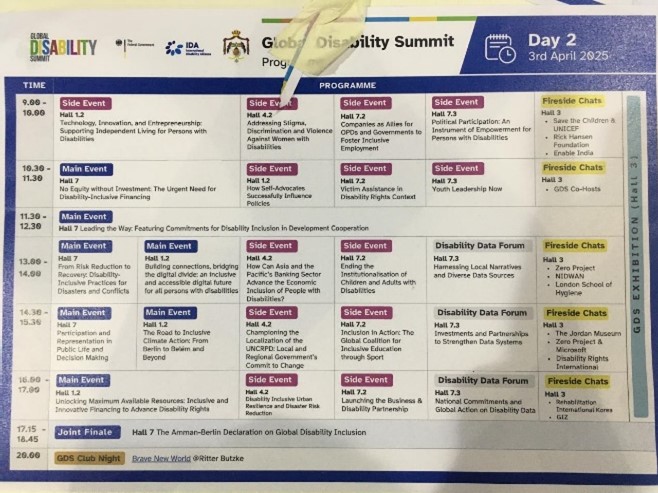
Die angebotenen Vorträge und Themen der zwei Summit-Tage.
Abschlusserklärung des Global Disability Summits
Amman-Berlin Declaration on Global Disability Inclusion
We have gathered here in Berlin to galvanize global efforts to achieve disability inclusion around the world.
We build on our shared commitment to the realization of the rights of persons with disabilities and to a human rights-based approach to disability-inclusive development, which is reflected in the near-universal ratification of the Convention on the Rights of Persons with Disabilities (CRPD).
We reaffirm the outcomes of the previous Global Disability Summits 2018 and 2022, the regional pre-summits in advance of the present summit as well as the civil society consultations.
We will work together to advance progress towards the full implementation of the CRPD as well as disability-inclusive international development cooperation and humanitarian action.
It is in light of the above that we adopt the present Declaration as the outcome document of the Third Global Disability Summit 2025 in Berlin.
Our Vision for an Inclusive World
We envision a world where all persons with disabilities, including women and children with disabilities, enjoy their civil, political, social, economic and cultural rights, with the elimination of all barriers that hinder the full and effective participation of persons with disabilities in society on an equal basis with others.
We envision a world where disability inclusion is a fundamental element of international cooperation, in particular international development programs and humanitarian action. In this world, meaningful participation of persons with disabilities and their representative organizations, including organizations of women with disabilities, is a lived reality in program planning, design, implementation, monitoring and evaluation.
We emphasize the important role of international, including South-South, cooperation in supporting national efforts to realize the purpose and objectives of the CRPD, while underscoring the obligation of each state party to fulfill its obligations under the CRPD and to allocate the maximum available domestic resources to this goal.
We recognize that international development programs must accelerate their efforts to address disability inclusion and to meaningfully include Organizations of Persons with Disabilities (OPDs). We re-affirm the 2030 Agenda for Sustainable Development, the Sustainable Development Goals, and their principles of leaving no one behind and reaching the furthest behind first.
Seeking to ensure that international development and humanitarian programs are harmonized with the CRPD and its Articles 11 and 32,
We declare the following:
1. We will strive for all our international development programs to be inclusive of and accessible to persons with disabilities, by actively making a positive contribution to inclusive and full equality and to non-discrimination and by doing no harm.
2. We will strive to ensure that at least 15 percent of international development programs being implemented at the country level pursue disability inclusion as an objective (“15 percent for the 15 percent”).
The 15 percent target requires joint action to increase efforts by focusing current resources on disability inclusion and dedicating more resources to this purpose.
We will striv4e to achieve this target by 2028, the year in which the fourth and next Global Disability Summit is to be held.
3. We recognize and celebrate the role of OPDs. We are thus determined to ensure the full and effective engagement of OPDs and their meaningful participation in all stages of development cooperation and humanitarian action. We
emphasize the need for a safe and enabling environment for civil society and all human rights defenders, in particular OPDs. We will strive to strengthen resource allocation for, and partnerships with, OPDs in the context of international cooperation.
4. We will strive to make inclusion a reality for all persons with disabilities, in particular for those belonging to under-represented groups, those who are facing a high risk of exclusion or multiple and intersecting forms of discrimination, especially women and girls as well as children and youth with disabilities. We will address multiple discrimination and promote gender equality. If discrimination is intersectional, then our response to it must also be intersectional.
5. We will strive to foster disability inclusion through international development cooperation, recognizing that disability inclusion is relevant for all sectors.
6. We will strive to make humanitarian action inclusive of, and accessible to, persons with disabilities, as required by Article 11 of the CRPD, the Sendai Framework for Disaster Risk Reduction, Security Council Resolution 2475 (2019) on Protection of Persons with Disabilities in Conflict and the Inter-Agency Standing Committee (IASC) Guidelines on the Inclusion of Persons with Disabilities in Humanitarian Action.
We pledge to make every effort to lift the barriers persons with disabilities are facing in situations of risk, including situations of armed conflict, humanitarian emergencies, and the occurrence of natural disasters, as well as in accessing relief, protection and recovery support. We will also ensure their participation in the planning, design, implementation, monitoring and evaluation as well as coordination of humanitarian action.
7. We will promote partnering with relevant stakeholders including national disability inclusion actors, the private sector, trade unions, academia and civil society to foster disability inclusion. These partnerships will be based on mutual learning and exchange to encourage greater research and both bilateral and multilateral funding of disability inclusion and related matters, including assistive technologies and artificial intelligence.
8. We will strengthen our efforts to gather data and evidence on the situation of persons with disabilities and on disability-inclusive international development cooperation as well as humanitarian action in order to enhance our policies, strategies and programs.
We recognize the OECD-DAC policy marker on the inclusion and empowerment of persons with disabilities as an important monitoring and steering mechanism and encourage its wide usage and continued strengthening. All parties, including multilateral institutions, are invited to report on disability inclusion in their programs. This is key for countries to be able to monitor their development cooperation portfolios.
9. With over a billion reasons to change, we stand ready to join forces and combine our strengths to ensure disability rights are effectively upheld today and in a post-2030 Agenda world.
